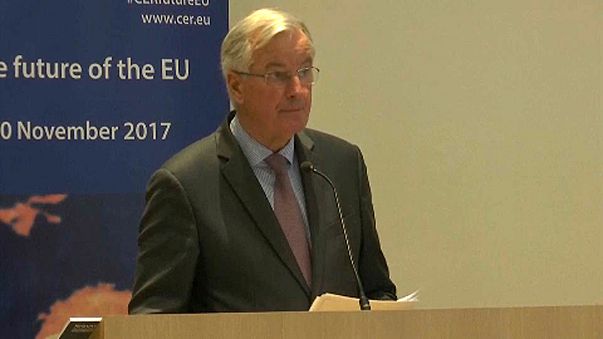European Union strikes out UK’s ideal approach to future trade
The EU has ruled out the UK government’s preferred approach to a
future trade deal, describing it as a risk to the European project, just as Theresa May is seeking to strike an agreement on the way forward within her cabinet.
The
inner cabinet is meeting at Chequers on Thursday to try to find an agreement
among warring cabinet members on an approach sketched out to ministers by the prime minister’s Brexit adviser, Olly Robbins.
Under what is understood to be the prime minister’s preferred model, the UK would
stay lock-step in regulatory alignment with the EU in some areas while finding
different ways to achieve the same outcomes in other sectors. In the so-called“third basket” of sectors, the UK would in time diverge from the EU and go its own way under the model.
Yet,
with something close to incendiary timing, the European commission, hours ahead of the cabinet get-together, has published a document ruling out the model.
It
is claimed by the EU that such an approach would breach an agreement among
leaders to prevent “cherry-picking” by the UK that it is said would pose a risk to the integrity of the single market.
The document says: “UK views on regulatory issues in the future relationship including ‘three basket approach’ are not compatible with the
principles in the [European council] guidelines.”
The
paper, discussed and agreed among member state diplomats, claims the model
proposed by the UK would also appear to give the UK a say in EU
decision-making. The paper responds that “no EU-UK co-decision” is possible and that the UK is either “in or out”.
The document adds that the approach proposed by the UK would also have to involve a central role for the European court of justice. Even if the UK weakened its red
lines to allow this, the paper claims, there would be a problem in enforcing
the Luxembourg court’s decisions without the rest of EU law being applicable.
“If UK aspires to cherry-pick: risk for integrity and distortions to proper functioning of internal market, aggravated by absence of full EU ‘ecosystem’”, the document notes.
The
paper, produced by the commission’s Brexit taskforce, led by Michel Barnier,
further emphasises the limits of what the UK can expect in a future trade deal.
There
will be customs controls at the borders, although waiting times may be
mitigated. There will be no mutual recognition of rules in financial services, for example, to give businesses on both sides of the channel confidence they
will be able to continue to operate.
The
paper warns: “No escaping from significant impact on trading conditions.”
The
intervention by the EU will only add to the pressure on the prime minister to
rethink her insistence that the UK will leave both the single market and the customs union when it withdraws from the EU.
Next
week, the EU will publish its draft withdrawal agreement, including legal text on the Irish border, under which the UK would in effect commit to keeping
Northern Ireland in the single market and customs union, unless a future free trade deal or unheard of technological solution can be devised to do an equal job in avoiding a hard border.
Under such a scenario, a border in the Irish Sea between
Northern Ireland and the rest of the UK would seem unavoidable, a scenario wholeheartedly opposed by the Democratic Unionist party, whose MPs give the Conservative government a working majority in the House of Commons.
The
Labour leader, Jeremy Corbyn, has already said his party backs the UK staying
in a customs union in order to ensure that such a dangerous situation would not
emerge.
He
is to make a speech next week fleshing out his approach. Those comments will be
watched keenly because of an amendment to the forthcoming trade Bill put down by Tory rebels, committing Britain to seeking a customs union.
Labour has not yet
committed to supporting the amendment, but if the party threw its weight behind
it, Conservative MPs could inflict a highly damaging defeat on May that would amount to a direct challenge to the prime minister on her red lines.www.semperdiamondlodge.com

Comments
Post a Comment